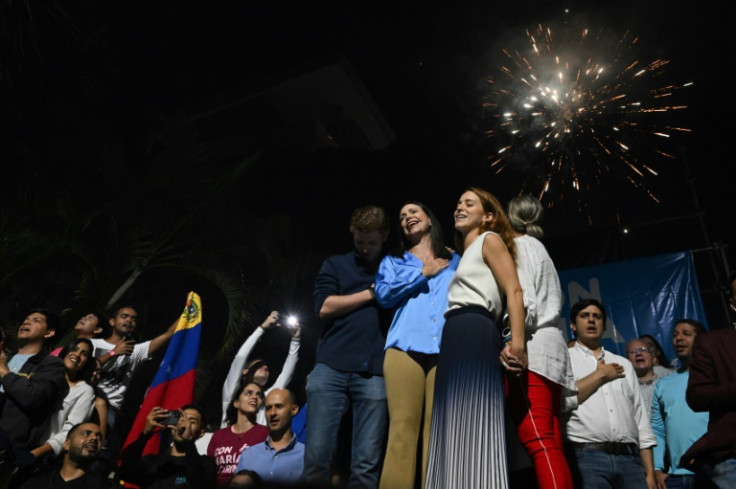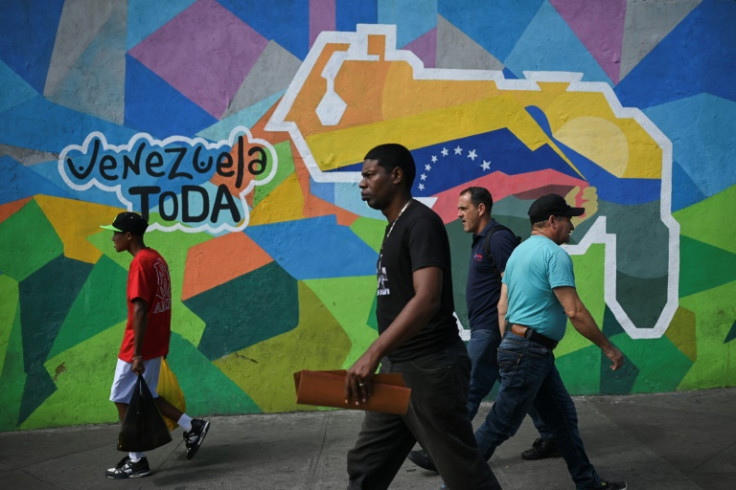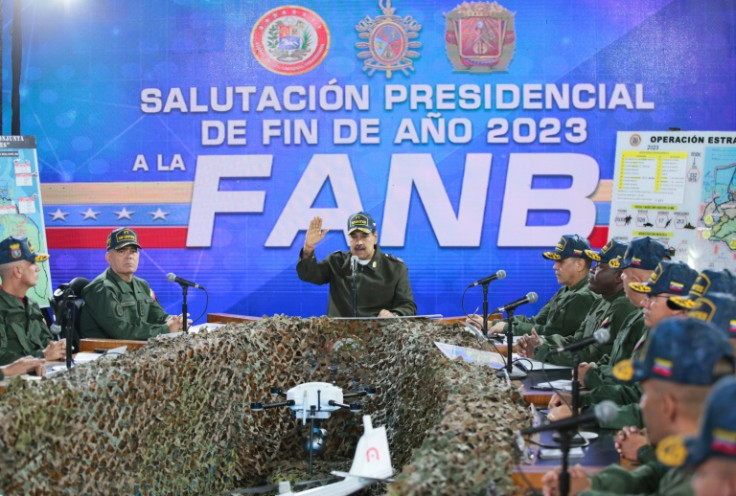
NEW YORK CITY - Venezuela is set to hold elections this year. And if there were no obstacles, they would likely be between opposition leader Maria Corina Machado and Nicolas Maduro.
And although this option seems more unlikely by the day, there's still a slim chance of it happening, according to Christopher Hernandez-Roy, the deputy director and senior fellow of the Americas Program at the Center for Strategic and International Studies (CSIS), a think tank based in Washington.
In an interview with The Latin Times, Hernández Roy explained why he thinks this is still the case, analyzed potential alternatives and pondered the different scenarios that may arise for the country depending on the direction the Maduro government takes.
But first, some context: back in October, Machado won the opposition-organized primary election, which anointed her as the candidate to take on the government.
However, in late-January, the Venezuelan Supreme Court ruled that Machado could not run for public office until 2036, upholding accusations of fraud and tax violations as well as supporting the economic sanctions the U.S. imposed on Venezuela over the last decade.
"They can't hold the elections without me and the millions of Venezuelans who support us. I have a mandate from the people and we will fulfill it," said Machado following the ban in Caracas, the country's capital. "Nicolas Maduro will not choose the people's candidate because the people have already chosen. Period."
Now, as the U.S. threatens to put back sanctions on Venezuela for potentially breaking the Barbados Agreement, an internationally-backed treaty that sought to ensure free and fair elections in Venezuela in exchange for the easing of these punitive measures, the question of what will happen this year in the country becomes more pressing.

The following interview has been edited for length and clarity.
Within the past weeks, there have been different developments in Venezuela that could determine the near future of the country. How would you summarize the current political climate in Venezuela?
The climate in Venezuela is one of hope and one of frustration. Hope, in the sense that, for the first time in over 10 years, the opposition has been able to coalesce over one candidate, and that's Maria Corina Machado.
One of the greatest challenges to bringing democracy to Venezuela is that the opposition has always been fractured, fighting amongst themselves, competing and not having a unified voice. But now there is that optimism because Maria Corina Machado has generated a lot of interest and excitement among a good group of the population who is just fed up with the dictatorship, fed up with the terrible conditions in the country.
But on the other hand, we are seeing Maduro playing his usual games. He signed an agreement in October in Barbados with the opposition, and promised to take a series of steps to take freer and fairer elections in 2024, and he pretended to do some of that. He released some American political prisoners, he promised to have some sort of a review process.
We're in a situation now where the opposition has chosen a candidate, the government has said that candidate cannot run, and we have to see what the next steps are. Certainly the Biden administration is trying to encourage with carrot-and-stick the Maduro government to rethink its position in regard with Maria Corina Machado, but more importantly to put in place a process that ensures free and fair elections that would include international observation, freer participation, and this remains to be seen.
The U.S. has threatened to snap back sanctions. If Maduro doesn't honor his pledge, I think we're basically at a situation where the agreement that was reached in Barbados is pretty much a dead letter. So, we're really stuck with a situation where we don't know, what the next steps are.
So what are some viable options for these elections?
I think there's still a chance— although very small in my mind— that Maria Corina could run. So there's that. If she runs, Maduro loses. The issue is, are there enough people in the Chavismo movement that want legitimate Chavismo and think that Chavismo can compete in future elections? Can they somehow convince Maduro and maybe Maduro leaves as a result of that, to allow Maria Corina to run? I think that's very unlikely.
I think it's more likely that Maduro holds some sort of election with another opposition candidate or candidates that he feels are not as threatening as Maria Corina Machado. I think that's more likely. And if you think about what happened in Guatemala these last sort of six months, Guatemala had an election, in which, before the election, a number of front running candidates were barred from running. But then it did have a democratic election with the people who were allowed to run. And, even though the so-called "Pacto de los Corruptos" tried to derail Bernardo Arevalo's assumption of office, the international community, the OAS, the United States, eventually, were able to get him to assume office. But that was a democratic election which started off with a few people who were not allowed to run in the election. So Maduro may be thinking he could do something like that, but when?
There's another scenario that says, there may be other people within Chavismo who think that Chavismo needs a legitimate election— I think this is also fairly low probability— it needs a new leader, and therefore somehow they get Maduro to step aside with some guarantees that he's not going to get pushed out of a 20 story window, and they run a competitive election. I still don't think they would allow Maria Corina to run, but it would be a more legitimate election.
And then there's the scenario where they run an election, they steal the election, Maduro has a new mandate, but then the year later, they organize a slightly freer and fairer election where the opposition gains some seats in the National Assembly, maybe some governorships, control of some municipalities. That way the regime can say, "see, we're not entirely a dictatorship, we do have a democratic space."

A few days ago, Maduro said that his party would win the elections "one way or another." What will this mean for democracy in Venezuela? And what can another Maduro term look like for the country?
Well, I mean, another Maduro term is just more of the same. The Maduro regime is basically a criminal government. It basically pillages the resources of the state for it to line its pockets. Poverty rates since the oil crash in 2014 have returned to something like 80% of the people in the country, it's just it's absolutely miserable.
So a new Maduro regime is just more misery and more poverty. And likely, more emigration, more Venezuelans leaving the country, more Venezuelans overburdening the capacity to respond by neighboring countries, including, of course, the United States. That's the impact. More depredation of natural resources, more drug trafficking, more corruption, all of the associated evils that have been documented that the regime is engaging in.
Do you think that Venezuela will listen to the US, or they would just turn the blind eye and keep their actions as they are?
So that's not an easy question to answer. Maduro, so far in my mind, has kind of indicated that he doesn't really care about the sanctions, but we know that's not true. We know that the sanctions are important. We know that it hurts his pocketbook. And when he doesn't have enough money, he can't keep his client's holistic system going, he can't pay off the military to ensure their loyalty, etc., etc. So, the sanctions do have an impact
Under the Barbados agreement, he hasn't done anything. So theoretically, the Biden administration should not renew the license (which will expire in April) for the oil sanctions, which means that they go back into place. This is really the only coercive tool that the U.S. has.
If there's absolutely no movement and in fact, we've seen steps going backwards, then I think the Biden administration has no other option than to put the sanctions back in place. But they're still hoping for negotiations to continue around some sort of free and fair election. So they're not ready to snap those sanctions back yet. They've talked about snapping the sanctions against the gold sector back into place very quickly. And as a result, Maduro has countered by saying, "oh, yeah, well, if you do that and we're going to prevent your planes of Venezuelan illegal migrants being repatriated from the United States to arriving in Venezuela," which is, of course, something the U.S. would prefer to avoid.
The sanctions remain a tool. It's a tool to, you know, encourage a certain kind of behavior. So far, there's no signs that behavior is going in the right direction. If anything, it's going in the wrong direction. So, probably sanctions would have to be re-imposed.
© 2025 Latin Times. All rights reserved. Do not reproduce without permission.





